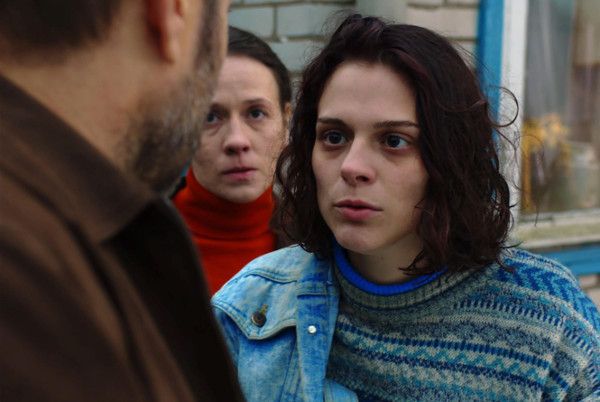 |
| Darya Zhovner as Ila in Closeness |
Closeness in all its forms comes under scrutiny in Kantemir Balagov's debut film, which tells the story of a Jewish family against the rise of violence that would become the Second Chechen War. The film focuses on the often-stifling relationship tomboy Ila (Darya Zhovner) has with her family and the consequences an abduction has on their entire community. Balagov is one of a number of young Russian filmmmakers to have benefited from a mentoring programme by Alexander Sokurov at the Kabardino-Balkarian University in the North Caucasus, which allowed youngsters with no previous experience to learn how to make their voices heard. Featuring a commanding performance form Zhovner in the lead and some excellent framing that heightens the sense of her characters' claustrophobia, many will find the inclusion of an actual tape of a killing from the period very hard to stomach, especially as it comes without warning. Balagov attended the first FIPRESCI colloquium of Russian Cinema in St Petersburg, where he answered questions about the film - which is also playing at London's Russian Film Week.
Can you tell us a bit about the backdrop to the film, which is set against the run-up to the Second Chechen War?
Those two peoples, the Kabardine and the Chechens, were never brotherly, they were just neighbours. Some people in the region would support the Chechens and some would support the Russians, so there was this division into two camps. But most important is that people were feeling this sense of war and that the war could easily spread to Nalchik [an area of Russia at the base of the Caucaus mountains]. Today's attitude towards the Chechens is quite distant. So they are present, they are being heard but they are being kept at a distance.
You use the indoors to create a kind of claustrophobia - why did you use this extensively?
When we started working on this film, we really wanted to maintain this feeling of closeness and claustrophobia. That also explains the format of the screen in 4:3. Since this was my debut, the budget was quite limited. We could do more outdoor shooting but we decided to make it more indoors, to show a private narrative and budgetary constraints were important too.
In the subtitles of the film, you state that you are Kabardian, but you made a film in which most of the protagonists are Jewish, how was it for you to explore that family, which is a different 'tribe' as you call it in the film?
I was quite familiar with Jewish culture and Jewish families and I had a Jewish girlfriend and could look at the way her family works and functions. I also should mention that the Kabardians and the Jewish are very different peoples but they still have many similarities in terms of tradition in terms of being obsessed with family rules and the two peoples are, to the same degree, orthodox.
 |
| 'When we started working on this film, we really wanted to maintain this feeling of closeness and claustrophobia' |
Alexander Sokurov was my mentor and he participated in the pre-production phase but he was not directly involved in the making of the film, because you could see from the image itself, from the colour scheme, the image, the music - none of it resembles any of his works. He understood that the film needs this and gave me full liberty to do what I wanted. He was present at the shooting for two or three days only because at that time he was working on Brodsky's play [Marbles] in Italy. After that, in post-production, he helped with the editing and sound.
You introduce yourself as the director in the subtitling and you give your name and your background. Why did you feel the need to write yourself into the story?
When we were first screening this film at an early stage to film critics, they were afraid that viewers elsewhere in Europe and even in some places in Russia wouldn't understand would the Kabardino-balkaria is, who the Kabardians are or what the context is. They might think that it's some Jewish territory somewhere, for instance. The subtitles serve to clarify these questions and to provide some context. It was advice from Alexander Sokurov to introduce those titles but also, for me, it has some personal meaning because I had a personal experience of working on the story and I wanted to show this connection by giving my name.
Could you talk a bit about the inclusion of the execution video in the middle of the film - it comes as quite a shock and obviously deliberately so. How common were those videos in that period and why did you decide to include it?
First of all, I decided to include this video to provide some geographical and historical context. Secondly, to show my personal connection to this because I myself saw this exact tape when I was 13 or 14. It was a little bit later, in 2002, probably. In our school there was a CD circulating around and we would watch it.
You saw it when you were younger and now you included it in the film, was it difficult to retrieve it nowadays to include it?
It was not difficult because you can find it on YouTube and social media but it was much harder editing it. When I saw it when I was younger, maybe I didn't understand some of the things, because when you watch it now, you understand the most horrifying is not that they kill him but how they do it and what they say while they're doing it.
The English-subtitled trailer is available on YouTube, although you should be warned it contains some of the real-life execution video footage mentioned at the top of this article.





















